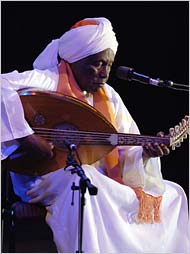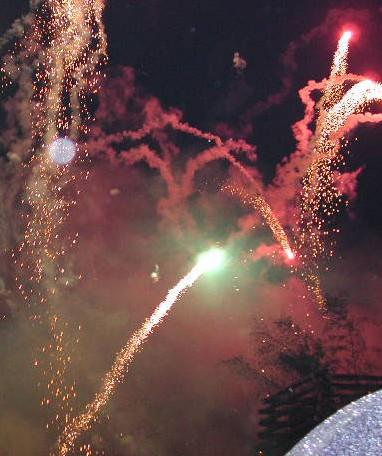Tuesday, May 30, 2006
Hamza El Din, 76, Oud Player and Composer, Is Dead

May his memory be for a blessing, may his beloved, Nadra, be comforted, may his music live.
May 25, 2006 NY Times
By JON PARELES
Hamza El Din, an oud player and composer who reinvented the musical culture of Nubia and carried it worldwide, died Monday in Berkeley, Calif. He was 76.
The cause was complications after surgery, said his wife, Nadra, who survives him.
Mr. El Din's austere, hypnotic music was based on his research into the traditions of Nubia, an ancient North African kingdom on the upper Nile, which was a cradle of civilization.
Accompanying his reedy voice with concise, incantatory phrases on the oud, Mr. El Din created a meditative music that sought a timeless purity. He performed dressed in white, with a white turban. But he was also a cosmopolitan musician who taught ethnomusicology and lived in Rome, Tokyo and California.
Hamza El Din was born in 1929 in Egypt, in what had been the territory of ancient Nubia, a crossroads of trade that flourished as early as the fourth millennium B.C. Nubia's former territory is now part of Egypt and the Sudan, and Mr. El Din's hometown, Toshka, was flooded after the building of the Aswan High Dam in the 1960's. He studied electrical engineering and worked for the national railroad in Cairo.
But he was drawn to music, first playing the round hand drum called the tar and then taking up the oud, a six-stringed lute. When he learned about the plans to build the Aswan Dam, which flooded much of ancient Nubia, he grew determined to preserve Nubian culture.
He studied Arabic music at Ibrahim Shafiq's Institute of Music and at the King Fouad Institute for Middle Eastern Music. He also traveled through villages in Egypt by donkey, collecting Nubian songs. With a grant from the Italian government, he studied Western music and classical guitar at the Academy of Santa Cecilia in Rome.
He drew on his studies, and on surviving Nubian traditions, to create music that fused rhythms and inflections from Nubia with Arabic classical elements and a virtuosic approach to the oud, an instrument not traditionally played in Nubia. He was reimagining the music of his home.
"One day, I felt the oud had the Nubian accent," he said in a 1996 interview with The San Francisco Chronicle. "I played for people in my village and they were mesmerized."
Mr. El Din performed in 1964 at the Newport Folk Festival and recorded two albums for the folk label Vanguard in 1964 and 1965. He moved to the United States, where he was a mentor to musicians, including the guitarist and oud player Sandy Bull. He settled in the San Francisco Bay Area. In 1971 his album "Escalay (The Water Wheel)" was released on the Nonesuch Explorer label.
Mickey Hart of the Grateful Dead produced Mr. El Din's album "Eclipse" (Rykodisc); Mr. El Din helped arrange for the Dead to perform at the Great Pyramids in Egypt in 1978.
Mr. El Din also made albums for Lotus Records and Sounds True. His music was used for movie soundtracks and for dance pieces by the Paris Opera Ballet, Maurice Béjart Ballet and the San Francisco Ballet; and he composed music for a version of the Aeschylus play "The Persians," directed by Peter Sellars at the Salzburg Festival.
He toured regularly, performing quietly intense solo concerts, and appeared at major festivals from Los Angeles to Edinburgh to Montreux.
He had stints teaching ethnomusicology at Ohio University, the University of Washington and the University of Texas. During the 1980's, with a grant from the Japan Foundation to work on a comparative study of the Arabic oud and the biwa, a Japanese plucked lute, he moved to Tokyo, where he lived until the mid-1990's.
Mr. El Din collaborated with ensembles including the Kronos Quartet, which recorded an arrangement of "Escalay" in 1992. When he returned to the United States, he resettled in the San Francisco Bay Area.
"I was a Nubian musician playing for my people," he said in the 1996 interview. "Now I'm a Nubian musician playing those same themes for the whole world."
His most recent album, "A Wish" (Sounds True) [recommended - Eliyahu], was released in 1999, but his wife said that he had recently completed recording a new album.
Copyright 2006 The New York Times Company
Comments:
<< Home
This is from the LA Times:
Hamza El Din, 76; Musician Popularized North Africa's Ancient Traditional Songs
From Times Staff and Wire Reports
May 30, 2006
Hamza El Din, considered the father of Nubian music who helped expose the sounds of his North African homeland to a worldwide audience, has died. He was 76.
El Din died May 22 at a hospital in Berkeley of complications from a gallbladder infection.
A composer and master of the oud, El Din became known to American audiences in the mid-1960s when he performed at the Newport Folk Festival and recorded two albums for the Vanguard label.
His music drew the attention of such musicians as folk singer Joan Baez, the classical Kronos Quartet and the rock band the Grateful Dead. He collaborated with the Kronos Quartet on the album "Pieces of Africa," and played with the Grateful Dead during its show at the Great Pyramids at Giza in 1978.
Other collaborations followed, including one with director Peter Sellars for a version of the Aeschylus play "The Persians" at the Salzburg Festival. Hamza's compositions also were performed by several ballet companies, including the Paris Opera Ballet and San Francisco Ballet.
Grateful Dead drummer Mickey Hart called El Din's music "mesmerizing, hypnotic and trance-like."
"Hamza taught me about the romancing of the drum," Hart told the San Francisco Chronicle. "His music was very subtle and multilayered."
El Din, who taught ethnomusicology at the University of Washington, Ohio University and University of Texas, lived for a time in Japan to study the biwa, a Japanese lute.
Born in 1929 in the former Nubian town of Wadi Halfa in northern Sudan, El Din was an electrical engineering student at what is now the University of Cairo when he took up the oud, an instrument similar to the lute, and the tar, a single-skinned frame drum from the Upper Nile.
At the news that his homeland would be part of the area to be flooded by Lake Nasser on the completion of the Aswan High Dam, El Din quit his engineering studies and traveled the region by donkey to warn his people of the dislocation that would come about from the dam project.
He also acquired material for many of his songs. He wrote about love, childhood memories, a wedding and the water wheel in his home village.
By playing the oud, not a traditional Nubian instrument, he found ways to expand the boundaries of his native music.
He returned to Cairo to study Arabic music and later studied classical guitar and Western music in Rome at the Academy of Santa Cecilia.
Since the late 1960s, he has lived much of the time in the Bay Area and toured extensively. He offered quietly intense solo concerts and appeared at major festivals throughout the world. He performed dressed in white robes and wore a white turban.
Critics say his most significant recordings were "Escalay: The Water Wheel," released in 1971, and "Eclipse," a 1982 release. His most recent album, "A Wish," was released in 1999.
El Din's survivors include his wife, Nadra.
Post a Comment
Hamza El Din, 76; Musician Popularized North Africa's Ancient Traditional Songs
From Times Staff and Wire Reports
May 30, 2006
Hamza El Din, considered the father of Nubian music who helped expose the sounds of his North African homeland to a worldwide audience, has died. He was 76.
El Din died May 22 at a hospital in Berkeley of complications from a gallbladder infection.
A composer and master of the oud, El Din became known to American audiences in the mid-1960s when he performed at the Newport Folk Festival and recorded two albums for the Vanguard label.
His music drew the attention of such musicians as folk singer Joan Baez, the classical Kronos Quartet and the rock band the Grateful Dead. He collaborated with the Kronos Quartet on the album "Pieces of Africa," and played with the Grateful Dead during its show at the Great Pyramids at Giza in 1978.
Other collaborations followed, including one with director Peter Sellars for a version of the Aeschylus play "The Persians" at the Salzburg Festival. Hamza's compositions also were performed by several ballet companies, including the Paris Opera Ballet and San Francisco Ballet.
Grateful Dead drummer Mickey Hart called El Din's music "mesmerizing, hypnotic and trance-like."
"Hamza taught me about the romancing of the drum," Hart told the San Francisco Chronicle. "His music was very subtle and multilayered."
El Din, who taught ethnomusicology at the University of Washington, Ohio University and University of Texas, lived for a time in Japan to study the biwa, a Japanese lute.
Born in 1929 in the former Nubian town of Wadi Halfa in northern Sudan, El Din was an electrical engineering student at what is now the University of Cairo when he took up the oud, an instrument similar to the lute, and the tar, a single-skinned frame drum from the Upper Nile.
At the news that his homeland would be part of the area to be flooded by Lake Nasser on the completion of the Aswan High Dam, El Din quit his engineering studies and traveled the region by donkey to warn his people of the dislocation that would come about from the dam project.
He also acquired material for many of his songs. He wrote about love, childhood memories, a wedding and the water wheel in his home village.
By playing the oud, not a traditional Nubian instrument, he found ways to expand the boundaries of his native music.
He returned to Cairo to study Arabic music and later studied classical guitar and Western music in Rome at the Academy of Santa Cecilia.
Since the late 1960s, he has lived much of the time in the Bay Area and toured extensively. He offered quietly intense solo concerts and appeared at major festivals throughout the world. He performed dressed in white robes and wore a white turban.
Critics say his most significant recordings were "Escalay: The Water Wheel," released in 1971, and "Eclipse," a 1982 release. His most recent album, "A Wish," was released in 1999.
El Din's survivors include his wife, Nadra.
<< Home



 "Wherever I am, my blog turns towards Eretz Yisrael
" - JAMEEL
"Wherever I am, my blog turns towards Eretz Yisrael
" - JAMEEL "blogs are best when served with shiraz" - The Godol HaDor
"blogs are best when served with shiraz" - The Godol HaDor Questions about your life? Go AskShifra.
Questions about your life? Go AskShifra.